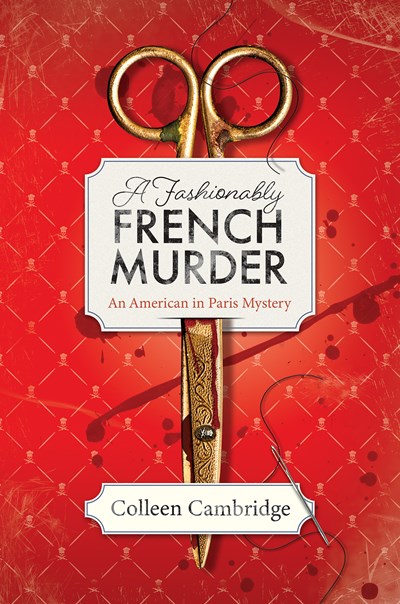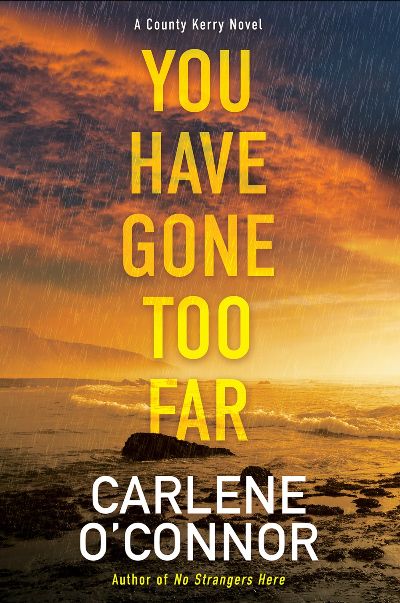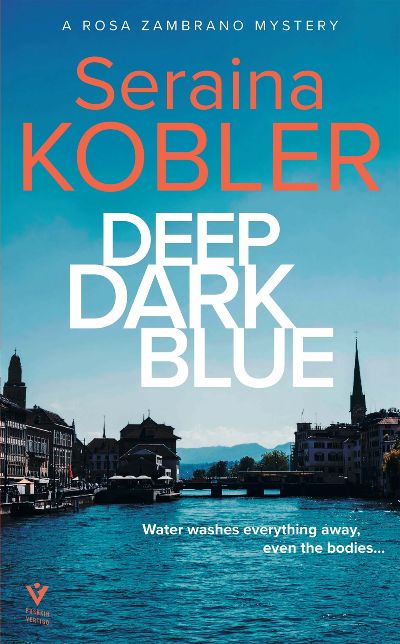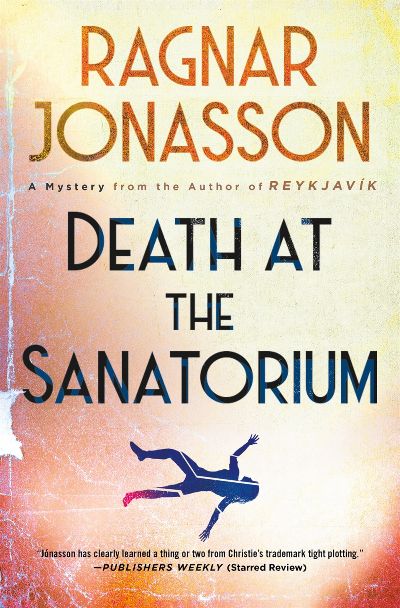Expat Tabitha King—formerly of suburban Detroit—is living, as the kids would say, her best life. She’s upped and moved to post-war Paris—she’s bilingual thanks to her mother and French grandmother—and this third, and best, in the mesmerizing “American in Paris” series finds Tabitha hanging out with her chum Julia Child, from whom she picks up some much-needed cooking tips. She’s also settling disputes between her Grand-père and his partner, Oncle Rafe (they are reopening a restaurant, thus the agida) and dipping her toe in the heady world of haute couture, with Christian Dior, who makes a cameo appearance, leading the way with his “New Look.” But when Tabitha discovers a body in one of the exclusive fashion ateliers, all the frothy fun comes to a halt, or at least a sputter, as Tabitha, with the sometime help of the all-too-handsome Inspecteur Merveille, throws herself into the search for the murderer. It’s a search that takes Tabitha back to Paris during the Occupation and the work of the Resistance against the Nazis and the French Vichy government, as well as those whose role was less clearly defined. Rich in history, full of the value of friendship and family, and with a very, very slow-growing romance (we want more, Colleen!) this is certain to be one of the best mysteries of 2025.
International
O’Connor’s latest Ireland-set novel is darker than her previous titles, but will still work for her many fans. Steadfast, kind veterinarian Dr. Dimpna Wilde is back, and this time life in her hometown, tourist hot-spot Dingle, Co. Kerry, is repeating itself in a macabre way. Only locals remember that 29 years ago, a cult centered around two men’s obsession with pregnant women ended in death and the men being sent to prison. They’re out now, and horrifyingly seem to be at it again, as a pregnant woman is found dead in a bog near the town and another is missing. A local child has been snatched, too, and Dimpna’s love interest, Detective Inspector Cormac O’Brien, is on the case, desperate to find the missing locals. An officer who worked the previous case threatens to destroy this one with her fixation on the just-released men. The best and the worst of small-town life come together here to great effect, and the nail-biting chronicle of the missing duo’s ordeal, with the pregnancy clock ticking, makes for an engrossing read that’s topped off by an exciting, satisfying ending. A realistically portrayed deaf protagonist adds texture to the story. While you’re waiting for this terrific read, watch a documentary with elements of similarity: Gloriavale: New Zealand’s Secret Cult.
And now for something completely different. Carlo Fruttero and Franco Lucentini were well-known Italian authors who co-authored several mysteries, throughout the 1980s and ‘90s, under their surnames of Fruttero & Lucentini. Their best-known works are The Lover of No Fixed Abode, set in Venice, and The Sunday Woman, which was made into a film starring Marcello Mastroianni and Jacqueline Bisset. Runaway Horses takes place in Siena during the Palio of Siena, the biannual horse race that the Sienese have been celebrating since the 13th century. It features lawyer Enzo Maggione and his wife, Valeria, who are traveling from their home in Milan to Siena, visiting Valeria’s brother along the way. But the two never make it to the farm; instead, they encounter a violent storm and take refuge in a nearby, sprawling estate. Here they find a most idiosyncratic group, including Puddu, the best known of the Palio’s jockeys. Fruttero and Lucentini take the reader deep into the arcane practices of the Palio, which are full of plots and counterplots, while Enzo and Valeria discover their attraction not only to each other but to other residents on the estate as well. Readers with an interest in Siena may enjoy the exhibit Siena: The Rise of Painting 1300-1350, which is currently on display at the Metropolitan Museum and will travel to Britain’s National Gallery in spring 2025.
The city of Zurich, surrounded by water, offers scenery, culture, scientific innovation, and activism to its citizenry. Rosa, a member of the maritime police, usually swims or rows daily, but takes a morning off to have her eggs harvested and frozen. The body found in a fisherman’s net days later turns out to be that of the doctor who performed the procedure. Despite her personal involvement, Rosa is assigned to work the case with the regular police department, awkwardly partnering with a former love interest. Multiple crimes, seemingly unconnected, ultimately come together. Cutting-edge genetics, not usually mystery fodder, is the key. Rosa and her friends and colleagues are engaging, and unlike her American counterparts, Rosa has time for an active social life. The translation is smooth but still carries a cadence and flavor that keeps its context. Intrigue, corporate greed, runaway science, and sexual infidelity come together in a complicated story that may send readers to a map of Zurich for the bigger picture.
A wonderfully compelling crime thriller that takes the reader deep into Pakistan in pursuit of a newly discovered mummy, known as the Persian Princess, and based on a real-life scandal that rocked the antiquities world back in 2000. Dr. Gul Delani, archaeologist and expert in ancient art, is woken in the middle of the night and hustled off to a remote part of the country to inspect a recently discovered mummy that came to light as part of a drug bust. Initially, the mummy appears to be authentic, although some of the iconography is unusual, and Gul is eager to bring the discovery back to Karachi and begin to analyze it. But quickly the mummy is claimed by different forces within the country and attracts corruption like bees to honey. The Museum Detective pulls into the broader narrative the story of Gul’s niece, a teenage girl committed to feminism who disappeared several years ago; Gul’s brother, a financial investor who succumbs to corruption; other scholars who have their own agendas; and the wonderful Mrs. Fernandes, who cares for Gul along with scores of children and teens who live on the street. All these characters and subplots come together brilliantly, creating an outcome that is nothing less than shocking. In Gul, Maha Khan Phillips has created an amateur sleuth whom readers will be all too happy to meet again and again.
Mysteries and the theater make for wonderful marriages—there are scores of examples—and this recent contribution from Colleen Cambridge is completely on point. Agatha Christie and household have temporarily moved from her country estate, Mallowan Hall, to London. The exiles include Phyllida Bright, Christie’s housekeeper (and so much more, including amateur sleuth). But Phyllida is a bit stressed out. She has a love/hate relationship with London—something is making her nervous—plus there is the staff to manage, including the temporary faux-French chef. But enough with the escargot, there’s a murder (Archibald Allston in the Adelphi Theater) followed by another (Benvolio at the Belmont Theater). See where this is headed? Death by alliteration, unless Phyllida gets there in time. This delightful mystery provides a fun look at London’s historic theaters, a glimpse at London’s LGBTQ nightlife, a splendid dénouement right out of a Christie novel, and most remarkably of all: a love interest for Phyllida. Lots of fun to be had here.
Thirty-two years ago, curmudgeonly, old-school Detective Superintendent Peter Diamond of the Bath CID made his literary debut in the Anthony Boucher Award-winning The Last Detective, exonerating a woman accused of murder. Three decades later, the seasoned cop, much to his dismay, is under pressure to retire. For Diamond, whose identity is tied to his job, “retirement is the waiting room for death.” But his partner, Paloma, convinces him to accept his former colleague Julie Hargreaves’s invitation to visit her in the quaint village of Baskerville. Leaving the mean streets of Georgian Bath for rural Somerset, Diamond soon learns that Julie has an ulterior motive for his visit; unable to proceed further in her inquiries due to a physical disability, she wants her old boss to reexamine (unofficially) the manslaughter conviction of farm owner Claudia Priest for the suffocation death of a man in a grain silo. Julie suspects that the fatal accident was murder and that someone other than Claudia was responsible. Embarking on a busman’s holiday as an undercover detective, Diamond aims to solve his first village mystery, even if it means mucking in real mud (including reluctantly helping a cow give birth). As he tries on different amateur sleuthing hats (bumbling Columbo, nosy Miss Marple), he begins to learn things about himself that reveal there might be a possibility of a good life after retirement. MWA Grand Master Lovesey bids a fond farewell to his protagonist with this bittersweet series finale that mixes a cozy Midsomer Murders setting with colorful characters, surprising twists, and plenty of heart and humor.
A new Higashino that will meet the expectations of his many fans, and then some. As is typical of Higashino’s unique police procedurals, the story goes both deep–into the past of its leading characters—and broad—Japan today, for example, where we learn about Japanese culture, such as the world of hostess clubs. The story begins with the discovery of a young man’s body in Tokyo bay; a bit of research reveals he is quite the loser who lives off his girlfriend while continuing to abuse her. But by the time the detectives locate their apartment, she’s skipped town. A likely suspect? Yes, but with an airtight alibi. Which draws Detective Kusanagi to “Detective Galileo,” a scientific genius and old friend, and the star of Higashino’s most well-known work The Devotion of Suspect X. In Galileo’s hands, connections are illuminated, the trauma of the past is brought to the forefront, and we learn the startling connections that link our characters. Brilliantly plotted and wonderfully rich in characterization.
Christmas and cozies just go together. And the setting of this particular cozy series, Sea Isle in rural Scotland, is even more perfect than most for a Christmas tale. The seaside town where American doctor Emilia McRoy has made her home celebrates in a big and inclusive way, with traditional Christian festivities rubbing elbows with celebrations like Viking Yule and the Swedish St. Lucia Day. This year, an internationally famous band with roots in the town is visiting, adding at first to the excitement and then to Emilia’s tradition of investigating killings in Sea Isle. Taking the criminal side of the investigation is the doctor’s nemesis/crush Constable Ewan McGregor. Their future possibilities are already happening in the burgeoning, and cute, relationship between Emilia’s assistant, Abigail, and Abigail’s love interest, Henry. The four have their work cut out for them as they pry into secrets in the band’s relationships while dodging the media in a town that wants to help but is naive to the dangers afoot. The great cozy setting is matched here by the lovable but flawed characters and the tricky whodunit element. Readers won’t see the ending coming and will be eager to get Connelly’s two earlier books in the series (An American in Scotland and Death at a Scottish Wedding, both published earlier this year) while they wait for this one.
An excellent standalone that reaches back into Iceland’s history, prying open a past many would like to keep hidden. At the center of the story is criminology student Helgi Reykdal, who is back from studies in the UK and ready to join the Reykjavik police. Helgi is finishing his dissertation, which is focused on the famous murder of a nurse at an old, little-used Icelandic sanatorium some forty years ago. In all, there were six suspects at the sanatorium and two detectives. The case was never truly closed, and Helgi uses his dissertation to quietly investigate the remaining suspects, encountering only suspicion and hostility along the way. It’s a tight cast, and Helgi keeps his inquiry moving rapidly between 2012, the present day action; 1983, when the murder was committed; and 1950, when the sanatorium was home to tuberculosis patients. Despite the seriousness of the story, and some horrific depictions of domestic abuse, Helgi’s passion for Golden Age mysteries lends the novel some unexpected humor and fun. Highly recommended for a large swath of crime-fiction readers.










